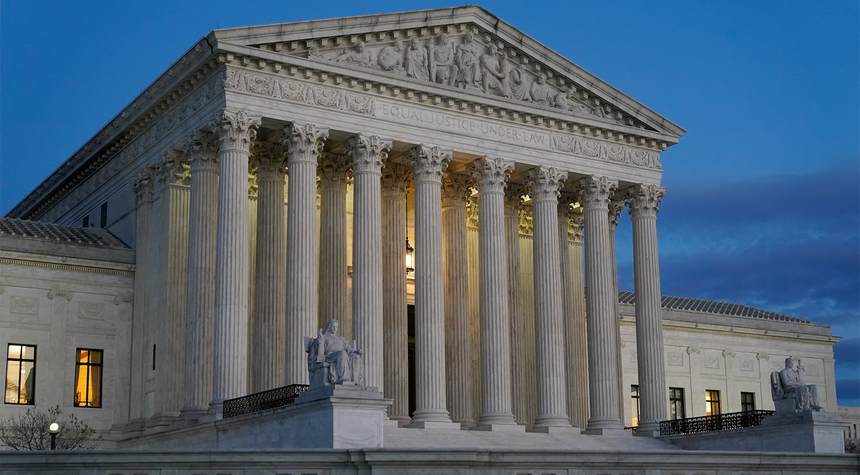Biden's DOJ Endorses Supreme Court Cases Against Twitter and YouTube That Could Demolish All Social Media
The US Supreme Court will hear two cases Tuesday that could fundamentally alter how the internet functions, if not stop it dead in its tracks. The cases both deal with social media and involve the terrorist group ISIS.
On Friday, November 13, 2015, Islamic (naturally) terrorists carried out a series of attacks in Paris and its suburb of Saint-Denis (see
Terror Attack In Paris– Sky News: At least 158 confirmed dead).
At 9:15 p.m., three suicide bombers targeted a soccer match between France and Germany. The three bombers and one bystander were killed.
About ten minutes later, gunmen opened fire on two restaurants, Le Carillion and Le Petit Cambodge. Thirteen were killed and ten wounded.
Just past 9:30, gunmen struck Café Bonne Bière killing five and wounding eight. That was followed by terrorists opening fire on La Belle Équipe, killing 21 and wounding seven, and a suicide bomber attack on a restaurant called Comptoir Voltaire, killing himself and wounding 15. As first responders were dealing with those attacks, three terrorists entered a concert at the Bataclan theater. When they stopped firing, 90 people were dead, and over 200 wounded or injured.
The official count is 137 dead, including seven terrorists, and at least 416 wounded or injured.
Gonzalez vs. Google
One of those victims was 23-year-old Nohemni Gonzalez, an exchange student from California State University at Long Beach.
Gonzalez’s family filed suit under the Antiterrorism Act, which allows the families of victims of terrorism to sue entities that aid terrorist groups. They contend that because ISIS videos are on YouTube, they may be recommended by the algorithm designed to recommend videos that YouTube, and its owner, Google, cooperate with terrorism. However, they do not allege that any of the Paris attackers saw an ISIS video and became a terrorist or took on this terrorist mission because of a YouTube video.
Google’s defense was that Section 230 of the Communications Decency Act gives it immunity from civil liability. This case has lost at every level with the Ninth Circuit ruling that not only was Google shielded by Section 230, but even if it wasn’t, its actions did not meet the definition of qualify as supporting terrorism.
I can’t tell you how my skin crawled as I struggled to control my gag reflex as I write this, but I think Google is the good guy here.
Twitter vs. Taamneh
This case came from the Ninth Circuit, where it was paired with Gonzalez vs. Google. It has some similar facts. Shortly after midnight on January 1, 2017, a gunman pledging allegiance to ISIS opened fire in the Reina nightclub in Istanbul. Thirty-nine were killed, and at least 79 wounded or injured.
One of the victims was Nawras Alassaf, a Jordanian citizen. Some of Alassaf’s family are US nationals and sued Twitter under the Antiterrorism Act, alleging that Twitter knew that ISIS used their platform and did not act aggressively to shut it down. Like Gonzalez, the family does not allege the Istanbul shooter had even heard of Twitter, much less used it to plot the shootings. Twitter claimed safe harbor under Section 230. Unlike Gonzalez, this claim survived a Ninth Circuit panel.
I can’t resist observing that if Twitter had devoted some of the resources it used to suspend me for telling some fat, unemployed BuzzFeed alumnus to “learn to code” (that isn’t a joke), they might have done a better job keeping ISIS off the platform. But, as with Google, in this case, I think Twitter is the good guy.
The Question
Whether Section 230(c)(1) of the Communications Decency Act immunizes interactive computer services when they make targeted recommendations of information provided by another information content provider, or only limits the liability of interactive computer services when they engage in traditional editorial functions (such as deciding whether to display or withdraw) with regard to such information.
Why It’s Important
I have my problems with Section 230. I think it, as currently interpreted, lets social media companies have their cake and eat it, too. They can restrict content like a traditional publisher while escaping liability from what they permit. That said, these two cases give a preview of what social media will be like if Google and Twitter lose.
There is no evidence in the record that anyone in either terrorist incident (unlike Benghazi, Hillary Clinton: Source of the Benghazi Video Lie) used YouTube or Twitter or was even aware those platforms existed. With that as the backdrop, it is easy to see how a decision against the defendants would result in all news footage of violent events being pulled for fear of “influencing” someone. There is no way that any gun videos could survive in this environment. Because every shooting would result in a rash of lawsuits claiming that YouTube or Twitter was responsible, it is doubtful that a lot of political videos could survive. The fact that the Biden Justice Department claims that an algorithm recommending a video based on the user’s previous choices is actually YouTube exercising its editorial discretion to endorse the video says all you need to know about where this could go.
For all of its flaws, Section 230 has done a good job of allowing social media to be used for political debate. Its critical flaw comes when progressives weaponize social media to shut down conservative voices. Texas and Florida have laws that forbid disfavoring content based on political viewpoint. Those cases will reach the Supreme Court soon.
It is a tragedy that ISIS terrorists killed nearly 200 people. However, it would be an even greater tragedy if that forced such strict moderation of social media that it was no longer worth the effort of participating.





Post a Comment